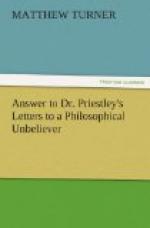Dr. Clarke, Mr. Hume and Helvetius, are writers whose arguments for and against a Godhead Dr. Priestley has much noted. The former says, “the Deity must have been infinite, if self-existent, because all things in the universe are made by him.” Are all things in the universe infinite? Why an infinite maker of a finite work? It is juster to argue, that whatever is self-existent must have been eternal. Nor is there any great objection to the converse of the proposition properly taken, that whatever is not self-existent must have been created and therefore cannot have been eternal. If this is fair arguing, matter cannot according to Dr. Priestley’s system have been created and be eternal also. But Dr. Priestley has no inclination to reconcile his opinions with those of Dr. Clarke. He has chosen a fairer method, and that is, to refute the arguments of former asserters of a Deity as well as to establish his own. Dr. Clarke he most effectually exposes where he enters upon the subject of space. It seems as if Dr. Clarke, having asserted that the Deity necessarily existed, had a mind that nothing else should necessarily exist but the Deity; and conscious that space at least also necessarily existed, he makes universal space an attribute of the Deity. With this reverie in his head he raises a syllogism of complete nonsense (vide Priestley’s Letters, P. 170.) where he supposes space to be nothing though he also supposes it to be an attribute of the Deity. Making it therefore an attribute of the Deity and knowing that space is eternal and unmeasurable he takes upon himself thereby also clearly to have proved that the Deity is so. Exclude the Deity, space will still exist and still be eternal and immense. Dr. Priestley knew well that Dr. Clarke’s argument in this respect was all a fallacy, and therefore he shews his sense in not adopting it. It is in fact an abuse of terms unworthy of a scientific reasoner.
The only argument attempted by Dr. Clarke, why the Deity must have had no cause, is, because it is necessary he should have none. Dr. Clarke says roundly that necessity is the cause of the existence of the Deity. This is very near the language of the ancients, who held that Fate controuled the Gods. Necessity is therefore the first God. Why then any other God than Necessity? What more has Helvetius said than that?
It is an old and unanswerable argument that, granting a God and his power infinite, whatever he wills is executed; but man and other animals are unhappy, therefore he does not will they should be happy. Or take the argument the other way and it will equally conclude against his power. With regard to Mr. Hume’s famous observations upon the evidence of miracles, Dr. Priestley thinks to make a short havock of them by observing that new, and therefore miraculous appearances, are continually presenting themselves; but although such new appearances may be instanced, they are not contrary to former experience, only in addition to




